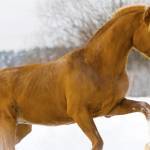Cold Weather Adaptations Keep Horses Comfortable

“It’s really cold outside, it’s starting to snow again, and the wind is howling. Is my pasture-kept horse all right?” In all but the most extreme winter weather, the answer is “Yes.” Most horses are well-suited for staying healthy and comfortable in cold weather as long as owners provide them with proper care.
The equine hindgut acts as an enormous furnace where the digestion of hay and other fibrous feeds produces a constant supply of heat from microbial fermentation. Owners need to be sure horses have an adequate supply of hay, increasing the amount as the temperature drops.
More heat can be produced by activity, including shivering. Pastured horses can be seen playing, bucking, and running from time to time, and this muscular exertion helps to keep body temperature stable. Short bouts of shivering do the same thing. Horses that shiver continuously in cold, wet weather probably need more hay, possibly a bit more grain, and access to shelter.
The horse’s winter coat is thick and dense. As long as it stays dry, it provides superior insulation. Natural oil tends to let rain and snow slide off, keeping moisture from penetrating deep into the coat. If you see snow building up on your horse’s back or rump, you are looking at proof that his body heat is not escaping through the hair to melt the snow.
When rain or wet snow manages to soak through to the horse’s skin, heat will be lost as the coat’s insulating ability decreases. Under these conditions, horses may need to wear a well-fitting waterproof blanket or have access to a windbreak or covered shelter.
Though horses sometimes stand in deep snow, their lower limbs and hooves almost never suffer damage from the cold. This is because the legs below the knees and hocks are made up mostly of bones and tendons, tissues that don’t freeze easily. In extreme cold temperatures, blood-shunting mechanisms in the hooves alter circulation patterns to preserve body warmth.
Regardless of the adaptations mentioned above, some horses may need additional help staying warm in bitterly cold, wet, windy weather. Very old, very young, sick, or extremely thin horses may need to be blanketed or brought into deep-bedded stalls to keep them from becoming dangerously chilled. Be sure that these horses have shelter, water, and a steady supply of good-quality hay along with their regular grain ration. Barns don’t need to be warm, and certainly should not be airtight; simply getting horses out of the wind is often adequate to preserve body heat.








